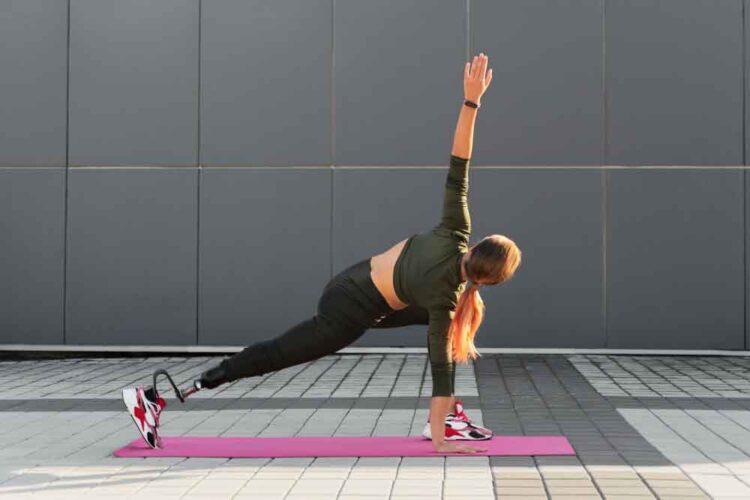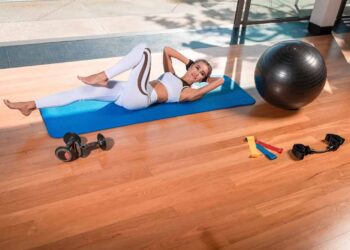Introduction
Are you a beginner looking to embark on a fitness journey but unsure where to start? Or maybe you’ve been away from exercise for a while and want to ease back into it without putting too much strain on your body. Low-impact cardio exercises might just be the answer you’re looking for.
Contrary to popular belief, you don’t need to jump right into high-intensity workouts to see results. In fact, low-impact exercises can be just as effective in improving cardiovascular health, building endurance, and burning calories. So, why not give yourself permission to start slow and steady?
Join us as we explore the best low-impact cardio exercises that are perfect for beginners like you. Discover how incorporating these exercises can help kickstart your fitness journey in a gentle and effective way. Say goodbye to the misconception that intense workouts are the only way to get fit, and open your mind to the possibilities of low-impact exercises.
Key Takeaways:
- Low-impact cardio exercises are beneficial for beginners starting their fitness journey.
- Low-impact exercises can improve cardiovascular health, build endurance, and burn calories.
- Starting slow and steady with low-impact exercises can be just as effective as intense workouts.
Introduction
When starting a beginner fitness journey, it’s important to choose exercises that are gentle on the body while still providing effective results. That’s where low-impact cardio exercises come in. These exercises are suitable for beginners who may be new to exercise or have certain limitations or injuries that prevent them from engaging in high-impact activities. In this section, we will delve deeper into the importance of starting a fitness journey with low-impact exercises and highlight their numerous benefits.
Importance of starting with low-impact exercises
Low-impact cardio exercises are a great way for beginners to jumpstart their fitness journey. These exercises are designed to be gentle on the joints, making them an ideal choice for those who may be experiencing joint pain or have musculoskeletal issues. By starting with low-impact exercises, beginners can gradually build up their strength and endurance without putting excessive strain on their bodies.
One of the key benefits of low-impact exercises is their positive impact on cardiovascular health. Engaging in activities such as walking, swimming, or cycling can help improve heart health, lower blood pressure, and reduce the risk of chronic conditions such as heart disease and diabetes. These exercises also promote weight loss and weight management, which further contribute to overall cardiovascular well-being.
Another advantage of low-impact cardio exercises is their low risk of injury. Unlike high-impact activities that put stress on the joints and connective tissues, low-impact exercises minimize the risk of strains, sprains, and other injuries. This makes them especially suitable for individuals who are new to exercise or have a higher risk of injury due to age or pre-existing conditions.
In addition, low-impact exercises help improve stamina and endurance, allowing beginners to gradually increase their fitness levels over time. These exercises engage large muscle groups and improve muscular strength, making everyday activities easier and reducing fatigue. By incorporating low-impact cardio exercises into their fitness routine, beginners can gradually progress to more challenging activities and achieve their fitness goals.
It’s important to address common concerns or misconceptions about low-impact exercises. Some individuals may fear that these exercises are not as effective as high-impact activities in terms of calorie burn or muscle toning. However, research has shown that low-impact exercises can still provide significant health benefits and contribute to weight loss and muscle development when performed consistently and at an appropriate intensity.
Overall, starting a fitness journey with low-impact cardio exercises is a smart and effective way for beginners to improve their overall health and well-being. These exercises offer a low-risk, accessible, and enjoyable option for individuals at any fitness level. In the next section, we will explore the top low-impact cardio exercises that are perfect for beginners.
Top Exercises for Beginners
When starting your fitness journey, it’s important to incorporate beginner-friendly cardio exercises that are low-intensity and easy to follow. These exercises will provide a gentle introduction to regular physical activity and help you get into the habit of working out regularly. Whether you’re looking to improve your cardiovascular health, lose weight, or simply stay active, these starting out workouts are perfect for beginners.
Detailed guide on why these exercises are suitable and how to begin
1. Jogging: Jogging is a beginner-friendly cardio exercise that can be done outdoors or on a treadmill. It helps improve cardiovascular endurance and strengthens leg muscles. Start with a light jog for 10-15 minutes and gradually increase your pace and distance over time.
2. Power Walking: Power walking is an excellent low-intensity exercise that can be easily incorporated into your daily routine. It provides similar benefits to jogging but with less impact on the joints. Aim for a brisk pace and walk for at least 30 minutes each day.

3. Cycling: Cycling is a fun and effective low-impact exercise that builds strength and endurance. Whether you choose outdoor cycling or a stationary bike, start with 15-20 minutes of cycling and gradually increase your time and intensity.
4. Swimming: Swimming is a low-intensity exercise that works the entire body without putting stress on the joints. It improves cardiovascular fitness, builds muscle strength, and enhances flexibility. Start with 20-30 minutes of swimming and gradually increase your time in the pool.
5. Planks: Planks are a simple yet effective exercise that targets the core muscles. They help improve stability, posture, and overall strength. Begin by holding a plank position for 10-15 seconds and gradually increase the duration as you get stronger.
6. Dance Workouts: Dance workouts provide a fun and engaging way to burn calories and improve cardiovascular fitness. Find a dance style or a dance fitness program that suits your preferences and start with a beginner-level routine.
7. High-Intensity Interval Training (HIIT): HIIT workouts alternate short bursts of intense exercise with periods of rest or low-intensity activity. They are time-efficient and effective for burning calories and improving fitness. Start with a 10-15 minute HIIT workout, gradually increasing the duration and intensity as you progress.
8. Weightlifting for Muscle Building: Incorporating weightlifting or resistance training into your routine helps build lean muscle mass, increase strength, and boost metabolism. Begin with light weights and focus on proper form and technique.
Remember to start any exercise program at a comfortable intensity and gradually increase the duration and intensity as your fitness level improves. It’s also important to listen to your body and consult with a healthcare professional before starting any new exercise regimen.
Creating a Starter Workout Plan
Sample weekly plan incorporating these exercises
Now that you’re familiar with a variety of low-impact cardio exercises, it’s time to create a starter workout plan that suits your needs and goals. Below is a sample weekly plan that incorporates these beginner-friendly exercises:
| Day | Exercise | Duration |
|---|---|---|
| Monday | Power Walking | 30 minutes |
| Tuesday | Swimming | 20 minutes |
| Wednesday | Cycling | 45 minutes |
| Thursday | Rest day | N/A |
| Friday | Dance Workout | 30 minutes |
| Saturday | Jogging | 25 minutes |
| Sunday | Low-Intensity HIIT | 15 minutes |
Feel free to adjust the exercises, durations, and rest days based on your preferences and fitness level. Remember that consistency is key. Start with shorter durations, gradually increasing the intensity and duration as you build strength and endurance. Listen to your body and prioritize rest and recovery.
Tracking your progress can also help you stay motivated and accountable. You can use a fitness app or journal to record your workouts, noting any improvements or milestones achieved. Celebrate your accomplishments along the way, no matter how small they may seem.
Remember to consult with a fitness professional or healthcare provider before starting any new exercise program, especially if you have any underlying health conditions or injuries.
Tips for Staying Motivated
When embarking on a fitness journey, staying motivated is key to long-term success. It’s normal to encounter challenges and obstacles along the way, but with the right strategies, you can maintain your enthusiasm and commitment. Here are some valuable tips to help you stay motivated in your exercise routine:
- Set Achievable Goals: Start by setting realistic and attainable goals for yourself. Break down your larger fitness goals into smaller, manageable milestones. This will give you a sense of accomplishment and keep you motivated to push forward.
- Find a Workout Buddy or Support System: Exercising with a friend or joining a fitness community can be a great source of motivation. Having someone to share your progress, challenges, and achievements with can make the fitness journey more enjoyable and keep you accountable.
- Vary Exercises and Workout Locations: One of the keys to staying motivated is to keep your exercise routine interesting and exciting. Try different types of exercises and vary your workout locations. This will help prevent boredom and keep you engaged.
- Reward Yourself: Celebrate your milestones and achievements along the way. Treat yourself to something you enjoy, like a relaxing spa day or buying new workout gear. Rewarding yourself periodically will help you stay motivated and give you something to look forward to.
- Seek Professional Guidance: If you find yourself losing motivation or struggling to stay on track, consider seeking professional guidance from a fitness instructor or personal trainer. They can provide expert advice, personalized workout plans, and tailored support to keep you motivated and accountable.
It’s important to remember that motivation may ebb and flow throughout your fitness journey. Be patient with yourself and embrace the process. By incorporating these tips into your routine, you can stay motivated and continue progressing towards your fitness goals.
Remember, staying motivated is a mindset. Keep a positive attitude, stay committed, and enjoy the journey!
Conclusion
As you reach the end of this beginner’s guide to low-impact cardio exercises, remember that taking the first steps towards a healthier lifestyle is an empowering choice. By incorporating these exercises into your fitness journey, you are setting yourself up for success. Consistency and perseverance are key to making lasting changes in your health and well-being.
By embracing low-impact cardio exercises, you are prioritizing your body’s needs and reducing the risk of injury. These exercises not only improve your cardiovascular health but also increase your stamina and energy levels. You’ll find that as you progress on your fitness journey, you’ll be able to challenge yourself and push your limits further.
Remember, your fitness journey is personal, and every step you take counts. Stay motivated by setting achievable goals, finding support in workout buddies or joining fitness communities, and rewarding yourself along the way. Seek professional guidance when needed and don’t be afraid to try new exercises or switch up your routine to keep things interesting and engaging. Take pride in the progress you make, both big and small, knowing that each step brings you closer to a healthier and more fulfilling lifestyle.











